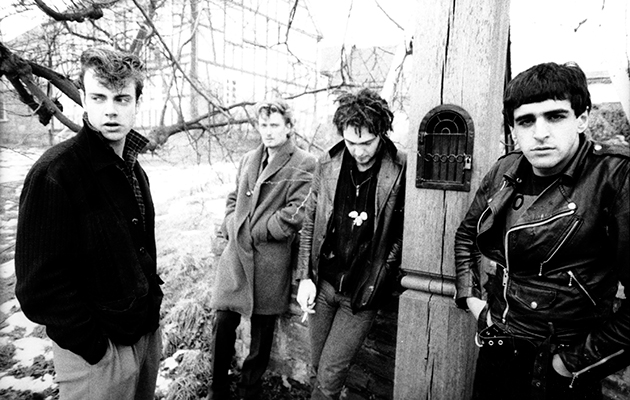Originally published in Uncut's September 2015 issue Order the latest issue of Uncut online and have it sent to your home! The mind-bending saga of Killing Joke. Involves maggots, burned flats, gay brothels, police raids, black magic, electric shock therapy, pig’s heads, self-harm, decapitated w...
Martin Atkins, once of PiL, drummed on 1990’s heavy Extremities, Dirt And Various Repressed Emotions, and then the band took a break. Coleman moved to an island off New Zealand – he still lives there half the year – and began a second career as a classical composer. “I taught myself,” he says. “I made a list of people I admired and went to seek them out. I was a pain in the arse but people like Philip Glass were very kind.” Another ally was Jimmy Page. “He’s like our granddad,” says Coleman. “I copied out my first symphony at his house.”
In 1992, Geordie began working on a greatest hits LP, Laugh? I Nearly Bought One, and re-established contact with Youth. The band fired up again. “I felt there was unfinished business,” says Youth. “We hadn’t made the great record we could have made. I had leverage, a label imprint and the band were on a low, they’d almost split up. So I suggested signing them to my label and producing.”
Two strong LPs resulted, Pandemonium (1994) and Democracy (1996), with the band exploring world music and electronica among the more familiar metal/industrial rock. Youth even persuaded Coleman to record vocals in the Great Pyramid. “I was into Earth energy, leylines, and on one DMT experience I saw a lattice of energy lines around the world and wanted to work in those places and turn the recordings into ceremonies. Jaz was interested. Doors open in the cosmic coincidence zone.”
They do indeed. In an unlikely turn-up, Coleman and Youth were handed the keys to the pyramid for three days for “meditation purposes”. Coleman explains: “We met three beautiful archaeologists. They introduced us to the minister responsible and we handed over a bribe. We took my engineer Sameh [Almazny] and he fell asleep in the King’s Chamber and dreamed that all these alien eyes were watching him. He woke up screaming, banged his head on the lintel and ran out. Then these three Egyptologists turned up as we were doing this ritual. They’d dressed up like Isis. Youth didn’t know who they were and says, ‘Here, who are those weird birds at the back?’ When we came out there were hundreds of Bedouin, chanting.” Coleman and Youth thought the experience was magical; Geordie merely notes drily that “They spent 24 grand for a couple of vocal tracks. That was an expensive holiday.”
Killing Joke were barely holding together. They lacked a drummer and Youth was in and out. “Jaz and Geordie were drinking too much, they were aggressive and bitter,” he says. “I didn’t want to tour, as I had kids.” He played on 2003’s belligerent self-titled album, produced by Andy Gill, but then ducked out of 2006’s Hosannas From The Basements Of Hell. In October 2007, Raven died of a heart attack. Ferguson, Youth, Coleman and Geordie attended the funeral and then went back to work. “It had been a thorn in my side,” says Ferguson. “Whenever they released a record it would irk me. I was just starting to get over it when Raven died. It was the first time I’d seen Jaz and it was healing. Rejoining was a hard decision, but the curiosity would have killed me.”
The reunited quartet has since cut a triptych of LPs – 2010’s Absolute Dissent, 2012’s MMXII and Pylon. “It’s a blessing to write about how fucked up I think the world is, then it ends up in a song with Jaz and Geordie,” says Ferguson. “I love listening to them play and I love playing drums. It doesn’t work without me. It’s good, but it’s like the sex is gone. What I do has a backbeat that resonates.”
Youth also gets something out of Killing Joke that his many other interests don’t provide. “We are all very opinionated, uncompromising people,” he says. “It’s rare to have all four members like that, and we have to find the harmony within that dissonance. It means I have to up my game. I might be mixing Pink Floyd, but then I’ll play something for Jaz and he calls me a wanker. It keeps me grounded. You leave the dignity at the door.”
The last word comes, inevitably, from Coleman. “Killing Joke gives me hope,” he says. “We have such different opinions, but if we can find common ground, there’s hope for the world. When I talk to most people in bands, they are aliens to me. That whole sociology, their culture, I don’t understand it. After Killing Joke, they seem so dull.”



